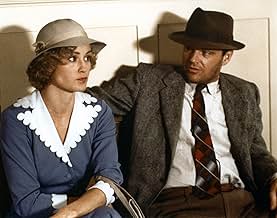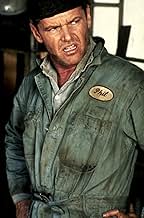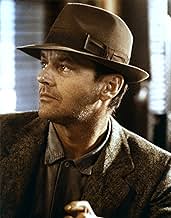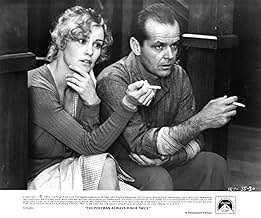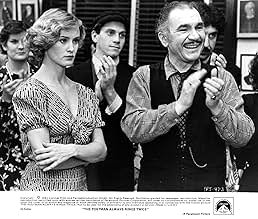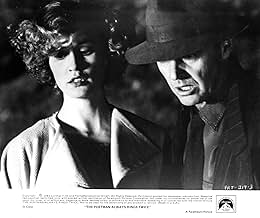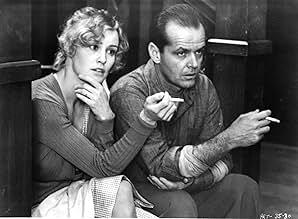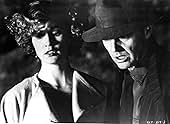Alors que la sensuelle épouse d'un propriétaire de camion-restaurant et un vagabond sans racines entament une liaison sordidement torride, ils conspirent pour assassiner son mari grec.Alors que la sensuelle épouse d'un propriétaire de camion-restaurant et un vagabond sans racines entament une liaison sordidement torride, ils conspirent pour assassiner son mari grec.Alors que la sensuelle épouse d'un propriétaire de camion-restaurant et un vagabond sans racines entament une liaison sordidement torride, ils conspirent pour assassiner son mari grec.
- Réalisation
- Scénario
- Casting principal
- Récompenses
- 1 victoire et 2 nominations au total
- Barlow
- (as Tom Hill)
Avis à la une
Lange is indeed sexy and more closely fits the part of a lower-middle class woman who married an older man, a café owner, for security than the stunning blonde bombshell Lana Turner, who was frankly a little too gorgeous for the part. John Colicos plays the café owner, Nick Papadakis, with clear fidelity to Cain's conception. In the 1946 production, the part was played by Cecil Kellaway, who was decidedly English; indeed they changed the character's name to Smith. Also changed in that production was the name of the lawyer Katz (to Keats). One wonders why. My guess is that in those days they were afraid of offending Greeks, on the one hand, and Jews on the other. Here Katz is played by Michael Lerner who really brings the character to life.
Jack Nicholson's interpretation of Cain's antihero, an ex-con who beat up on the hated railway dicks while chasing any skirt that came his way, the kind of guy who acts out his basic desires in an amoral, animalistic way, was not entirely convincing, perhaps because Nicholson seems a little too sophisticated for the part. Yet, his performance may be the sort better judged by a later generation. I have seen him in so many films that I don't feel I can trust my judgment. My sense is that he's done better work, particularly in the two films mentioned above and also in Chinatown (1974), One Flew Over the Cuckoo's Nest (1975) and such later works as The Shining (1980) and Terms of Endearment (1983).
The problem with bringing Postman successfully to the screen is two-fold. One, the underlying psychology, which so strongly appealed to Cain's depression-era readership, is not merely animalistic. More than that it reflects the economic conflict between the established haves, as represented by the greedy lawyers, the well-heeled insurance companies, the implacable court system and the simple-minded cops, and to a lesser degree by property owner Nick Papadakis himself, and the out of work victims of the depression, the have-nots, represented by Frank and Cora (who had to marry for security). Two--and this is where both cinematic productions failed--the film must be extremely fast-paced, almost exaggeratedly so, to properly capture the spirit and sense of the Cain novel. Frank and Cora are rushing headlong into tragedy and oblivion, and the pace of the film must reflect that. A true to the spirit adaptation would require a terse, stream-lined directorial style with an emphasis on blind passions unconsciously acted out, something novelist Cormac McCarthy might accomplish if he directed film. I think that Christopher Nolan, who directed the strikingly original Memento (2000) could do it.
For further background on the novel and some speculation on why it was called "The Postman Always Rings Twice" (Cain's original, apt title was "Bar-B-Que") see my review at Amazon.com.
(Note: Over 500 of my movie reviews are now available in my book "Cut to the Chaise Lounge or I Can't Believe I Swallowed the Remote!" Get it at Amazon!)
Such raw sensuality would easily persuade a man to lose his very soul. Nicholson's part is certainly unscrupulous to begin with, but in Jessica Lange he finds a confederate with even less scruples. The legal loose ends that dangled in the earlier version are avoided this time with a more plausible chain of events... and the story ends when the story ought to end, instead of being dragged on.
Wonderful character and situation development, intriguing and engaging, even when you know the story. Nice twists of the story from the Lana Turner and Italian ("Ossessione" 1943) versions.
** (out of 4)
Considering the talent in front of and behind the camera, there's really no way to look at this adaptation of the James M. Cain novel as anything but a disappointment. In the film, Jack Nicholson plays drifter Frank Chambers who enters the lives of Cora (Jessica Lange) and her much older husband Nick (John Colicos). Soon the drifter and Cora start up a sexual relationship, which leads to them planning the murder of the husband. This here would be the fourth version of the classic story and the second one filmed in America. Unlike the previous versions, director Bob Rafelson didn't have to worry about censors but even so this version isn't nearly as hot as the earlier one with Lana Turner. Outside a rather intense sex scene towards the start of the picture, this thing really never takes off, which is too bad because they've got a terrific cast and some beautiful settings but in the end the film is just flat. I think the first forty- five minutes are the best thing in the film as we see the love triangle set up and there's no question that the director has the look of the era down perfectly. I thought the setting really added a lot of atmosphere but sadly very little else happens. Nicholson was the perfect choice to play a drifter but the screenplay really doesn't give him too much to work with. Lange is clearly the best thing in the movie as she delivers a sexual charge to the thing. Colicos is also extremely good as the husband in a strong supporting performance. What really hurts the film is the second half because the director never really makes us believe or feel anything for the two leads. Are we supposed to hate them for what they've done? Are we supposed to be rooting for them to get away with the murder and live happily ever after? The entire second half of the film features way too many dialogue scenes that lead no where and in the end the "romance" that starts to bloom towards the end just never fully works. The film isn't nearly as bad as its reputation but at the same time there's no question that it's a major disappointment and a bitter feeling takes over when you think about what could have been.
Le saviez-vous
- AnecdotesDavid Mamet's first screenplay.
- GaffesModern-day paper currency is used in craps game set during Great Depression, instead of silver certificate dollar bills then in use.
- Citations
Cora: I gotta have you, Frank. If it was just us. If it was just you and me.
Frank Chambers: What are you talking about?
Cora: I'm getting tired of what's right and wrong.
Frank Chambers: They hang people for that, Cora.
- Versions alternativesCBS edited 30 minutes from this film for its 1986 network television premiere.
- ConnexionsEdited into American Cinema: Film Noir (1995)
Meilleurs choix
- How long is The Postman Always Rings Twice?Alimenté par Alexa
Détails
- Date de sortie
- Pays d’origine
- Langues
- Aussi connu sous le nom de
- El cartero siempre llama dos veces
- Lieux de tournage
- Barnsdall Rio Grande Service Station, Goleta, Californie, États-Unis(Cora and a Drunk Nick and Frank get Fuel)
- Sociétés de production
- Voir plus de crédits d'entreprise sur IMDbPro
Box-office
- Budget
- 12 000 000 $US (estimé)
- Montant brut aux États-Unis et au Canada
- 12 376 625 $US
- Montant brut mondial
- 12 383 416 $US
Contribuer à cette page



